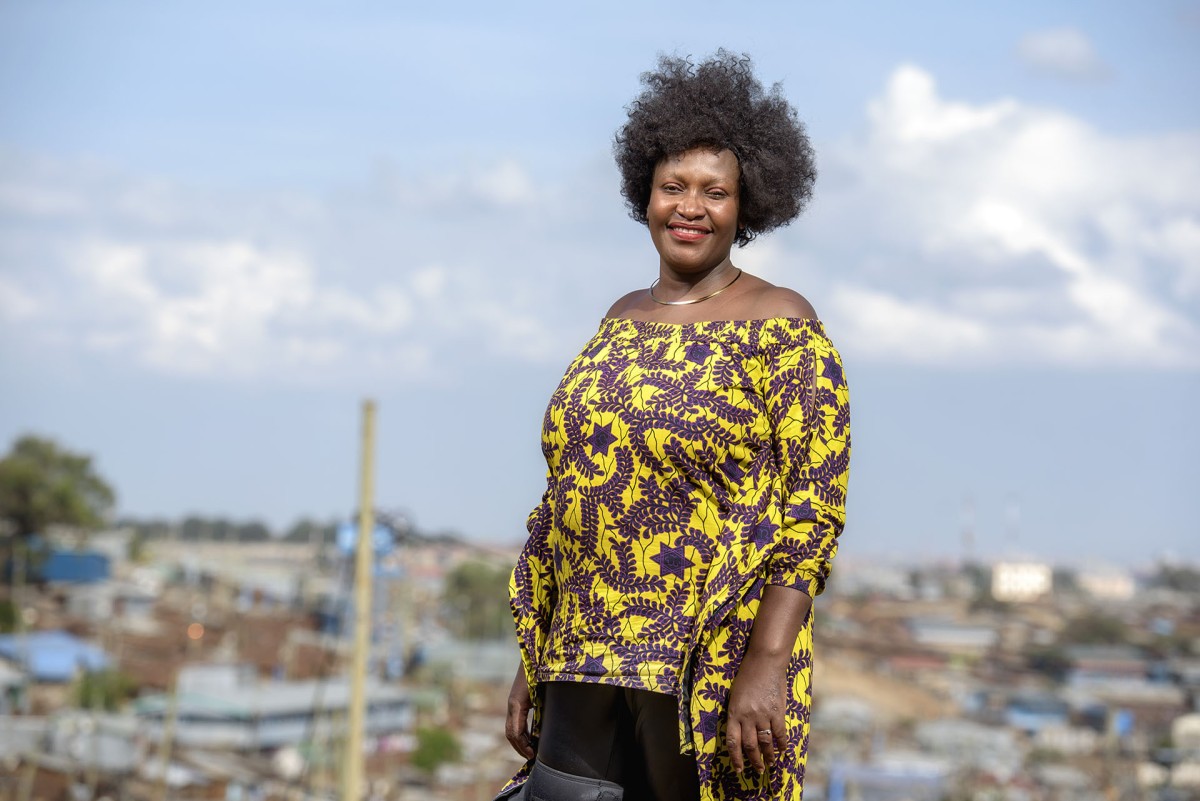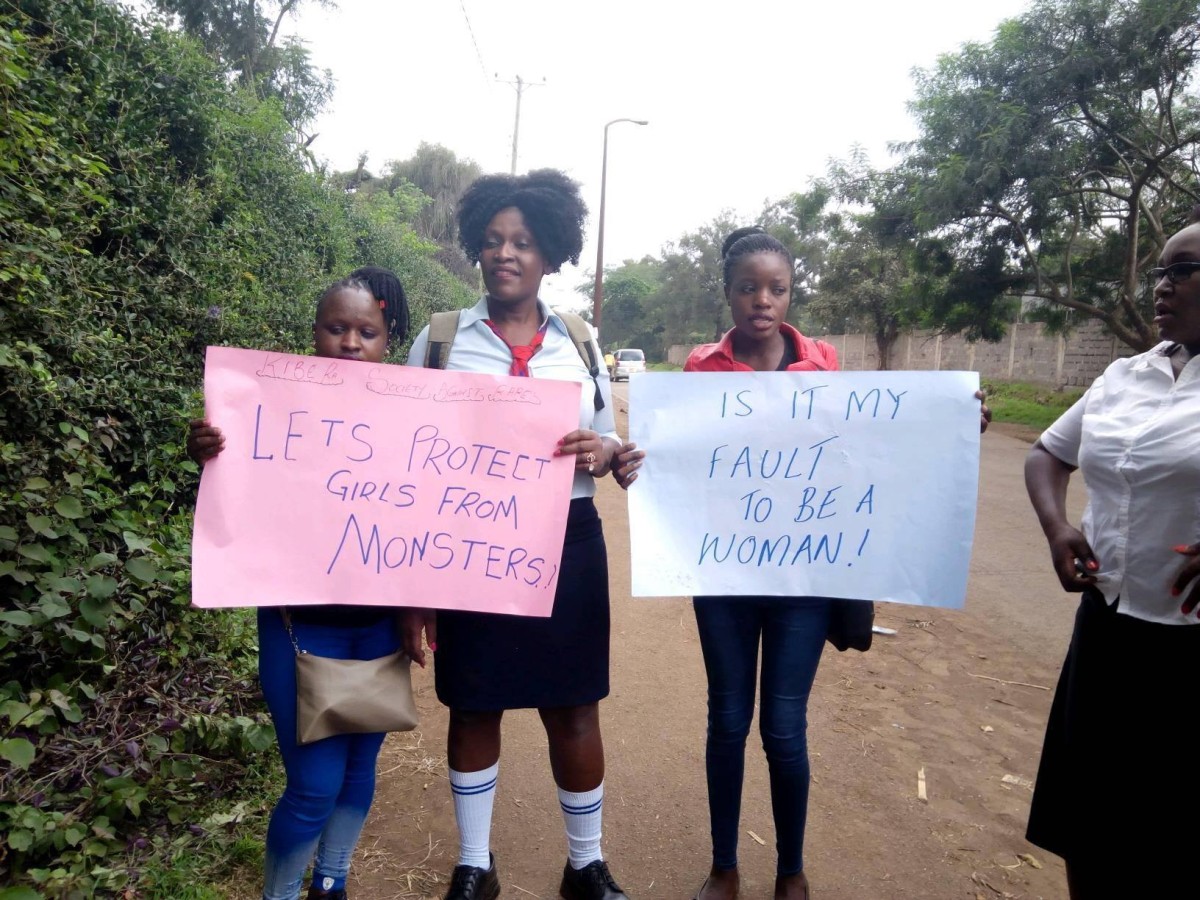Sextortion: The Silent Pandemic
In Kenya, women and girls are forced to have sex in exchange for water, a basic necessity. Politician Cecilia Ayot will not give up until this is a thing of the past.
Text: Nicera Wanjiru
Warning: this article contains reference to (sexual) violence
In Kenya, sextortion has taken on a different form. Women and girls are being pressured into sex in exchange for a basic necessity —water. Kenyan politician Cecilia Ayot decided to fight for the rights of her constituents by confronting the cartels who were perpetuating this vice. Unfortunately, it came at a cost; her political seat. But she vows not to relent until sex for water is no longer a thing.

Water is a constant source of anxiety, trauma, and psychological distress
I meet Cecilia Ayot, a former county assembly member of Nairobi County, in Kibera. The informal settlement, also known as The Chocolate City due to the rusty brownish iron sheets, experiences perennial water issues like most slums —leading to a scramble for the precious commodity. It is a natural resource that is not only essential for the preservation of all life but for human socioeconomic growth as well.
Unfortunately, it has become a constant source of anxiety, trauma, and psychological distress due to rising demand, and cartels that are only interested in making profits, without any regard for human life. The so-called ‘water cartels’ have remained a tough nut to crack for successive administrations. Worst of all, their water points have become havens for sextortion.
'Water is a necessity that the government should be providing for free'
‘Sextortion refers to sexual exploitation in which abuse of power is the means of coercion, in this regard in exchange for water, yet it is a necessity that the government should be providing for free,’ Cecilia says. ‘Since the cartels are aware that these families are not well-off, they ask for sex instead of money, from both school-going girls and married women. The scarcity of the commodity usually results in very long queues, so the woman who can sleep with the water vendor or cartel is given priority.
‘This dehumanises these women as it adds to other socioeconomic challenges that they face, while also affecting the girls’ performance in school, who may end up abusing drugs or in early marriages. Due to the influence and power that these cartels wield, anyone who dares try to expose them usually ends up relocating due to threats. In our community, you will be lying to yourself if you think you will get police protection because nothing ever happens when you report to them.
‘This leads to the destruction of many lives since most of these girls are being infected with HIV at a very young age, something that is becoming a common occurrence. Almost all water points in Laini Saba are in the hands of cartels who determine the cost, leading to high prices especially when there is scarcity. Apart from the expense, these water points have become havens of sexual exploitation,’ she states.
Learn more about Simavi's work
Subscribe to our newsletter
‘It started long ago. I know of people, close friends and relatives, who have gone through it. I see the effects every day; some were infected with HIV/AIDS and died. Even as we speak, the rate of girls and women being infected is still very high. I usually don’t like talking about this topic,’ she says, trying to hold back tears.
‘When we were young, we used to fetch water at night from the golf course since it was the only time that you could get water for free. During that time I witnessed terrible things. Young girls would be raped, and as we speak today, some died while others are drug addicts. Only a few ever overcame the trauma.’
When asked how to deal with the cartels, the former legislator admits she may not have the solution, but she has some recommendations. ‘There is a need to approach this differently, starting with positive parenting and putting the Government to task. The question is why don’t we have water? They keep saying we don’t have land but when they want to construct roads they demolish structures and make way. Why can’t they do the same and build water points? Water in Laini Saba is more expensive than any other place in Kibera!’
Drilling boreholes is not the solution
At the height of the pandemic, the Nairobi Metropolitan Service drilled boreholes in every community including Cecilia’s, though she suspects there may have been vested interests in the projects; ‘We must understand why they were made because that was not the solution. They were made because there were people who wanted contracts. For instance, in Laini Saba where one was drilled the area’s leadership was not involved, so for me, that was a half-baked solution.
‘The Nairobi Water Company is a wholly-owned subsidiary of the County Government of Nairobi. If the latter wants to solve the water problem, why don’t they just lay pipes, put a few water points, and continue doing so over time to enable a continuous supply of water at very affordable rates? I think all these problems are by design, with all fingers pointing to the government before anyone else.
Passing a bill is not easy
‘Since they are not taking any action, development partners have the opportunity to partner with local organisations to realise this. When we go to the community, we can also ensure we have victim support centres and counselling because most of our girls have lost livelihoods due to what happened to them when they were young,’ she says.
‘That is a very difficult question,’ she says when asked about her achievements as a legislator. ‘MCAs (Members of County Assembly) are just legislators, so the things most people expect from us are different from what we do. We have a ward development fund of fourteen million shillings (one hundred and sixteen thousand dollars), though sadly it is at the discretion of the government that is in power and involves a lot of bureaucracy.
‘I participated in a lot of motions which include the budget increment, and we passed many bills, but they are yet to be implemented. MCAs should be rated according to their successful legislation policies. For instance, the bill on sextortion that I was pushing for was still in the early stages of drafting with the relevant organisations, then Covid hit and everything ground to a halt.
‘For your information, passing a bill is not easy, you need money for networking and lobbying. I will love to be a part of this particular one so I will connect those organisations to other legislatures to make sure it succeeds. It is for the benefit of our people and future generations,’ she states.
In her struggle to defend her people’s rights, she has to battle the cartels as well. 'When a well-connected health centre in Kibera was destroyed, an entire neighbourhood was left without water. I arranged for a water truck to come in and salvage the situation, but it was stopped and turned back by the cartels since it posed a threat to their interests and power.

Being a woman who is also an activist was a very big threat
‘They ganged up and sponsored one of their own to contest against me for our party’s nomination ticket. They feared my activism would eventually lead to the closure of their businesses which are hubs for sextortion. I managed to outsmart them, though I won with a margin of only three hundred votes. On seeing this they regrouped, mobilised more funds, and advised my opponent to vie for the seat on an independent ticket which our law allows. Unfortunately, I lost in the general elections to the cartel-backed opponent.
‘My fight was against the cartels. Don’t forget that these violators usually threaten the victims, so being a woman who is also an activist was a very big threat to them and their activities. I was threatened and called a prostitute, which unfortunately is a rite of passage for most women in politics. Due to my activism and the fight against cartels, I was the runner-up in the elections. However, the fight against gender-based violence must continue through the implementation of tougher laws which will ensure violators are punished.
‘I plan to take a small break from politics and go back to work on my projects at DADA Foundation. I want to continue working with young women, and issues of insecurity. If I, an Honourable Member could be stoned, what of that voiceless young lady? Collaborating with partners with similar objectives is also in my plans. I believe that we need to make sound economic-empowerment policies because people are languishing in poverty and undergoing emotional distress.
‘I am trying to come up with home-grown solutions for my community since I am still connected with them. I have plenty of time at the moment and am more focused, so it is easy to take on individual cases and see them through. Above all, the fight toward freedom from water cartels continues, and I will not relent until the day water will be safely accessible to our women and girls. One day water will be free for all, sextortion will have been neutralised, and there will be zero cases of sex for water,’ she says as she winds up.
Simavi and violence in the context of water and sanitation
Women and girls should be able to enjoy their right to water without having to fear for either their physical or emotional well-being. In most informal settlements, they are forced to leave their houses in the darkest hour of the night, walk long distances and queue for hours at the few available water points, just to get this precious commodity.
Unfortunately, these places are managed by men and boys with an unhealthy sense of power over them, and they proceed to ask for sexual favours from them in exchange for water. Keep in mind that the distance between their homes and these places is not that safe, either during the day or at night. These are all risk factors for women and girls; the risk of being harassed, raped, abducted, or pressured into having sex for water.
Simavi has been raising awareness of this problem by performing research in Uganda, Bangladesh and Nepal to provide solid evidence on the underlying causes of violence against women and girls in the context of water and sanitation. Prevention is a structural element of all the programmes that they work on. They ensure this by; Making sure that facilities and services are safe to use for women, providing a safe space for them to discuss their challenges, discussing gender roles at household and community levels, and making sure that girls can say ‘no’ to sextortion.
This story was made together with Vice Versa Global
Do you want to know how Simavi and it's partners work on access to water and sanitation? Read it on the Right for her-pages of this website.


